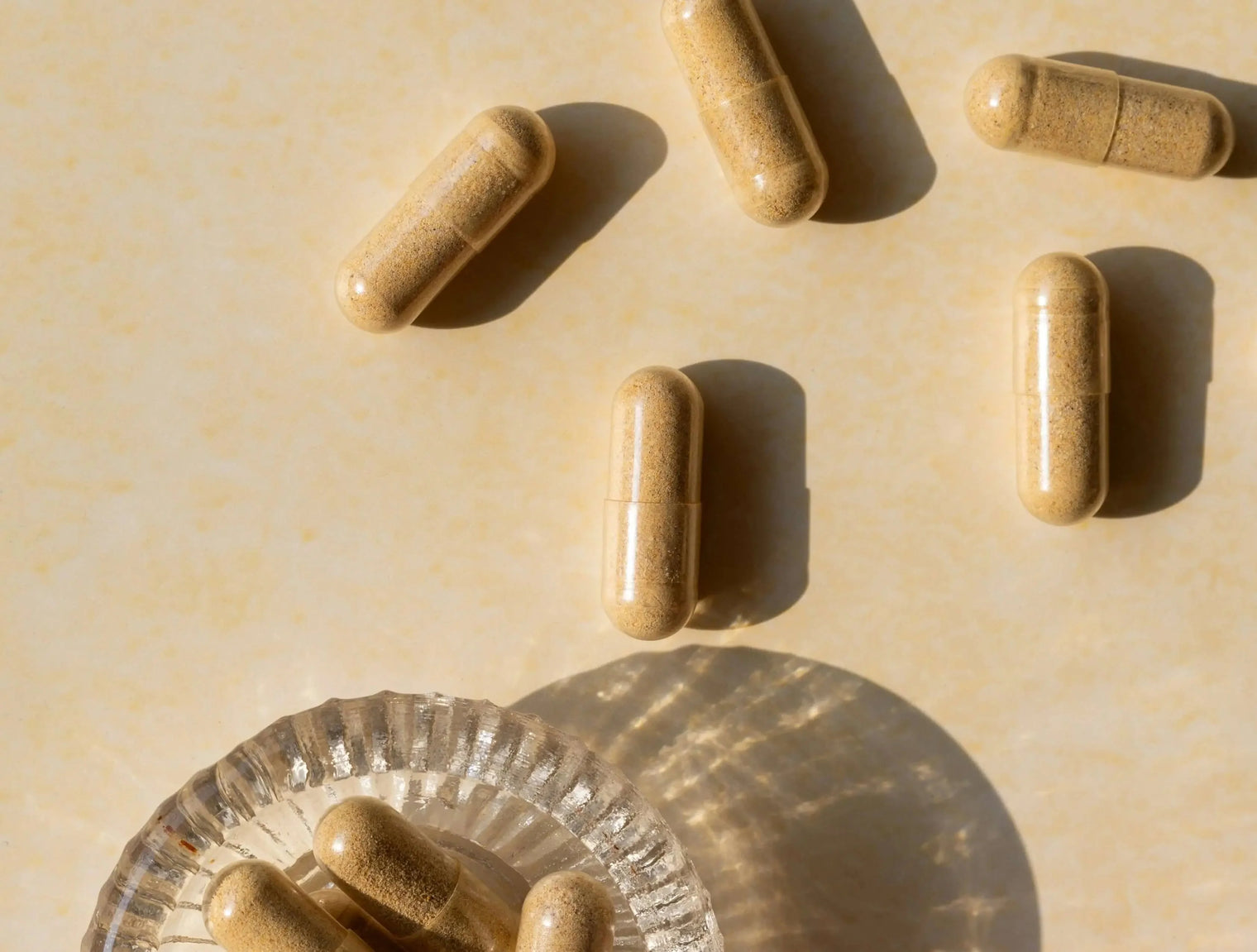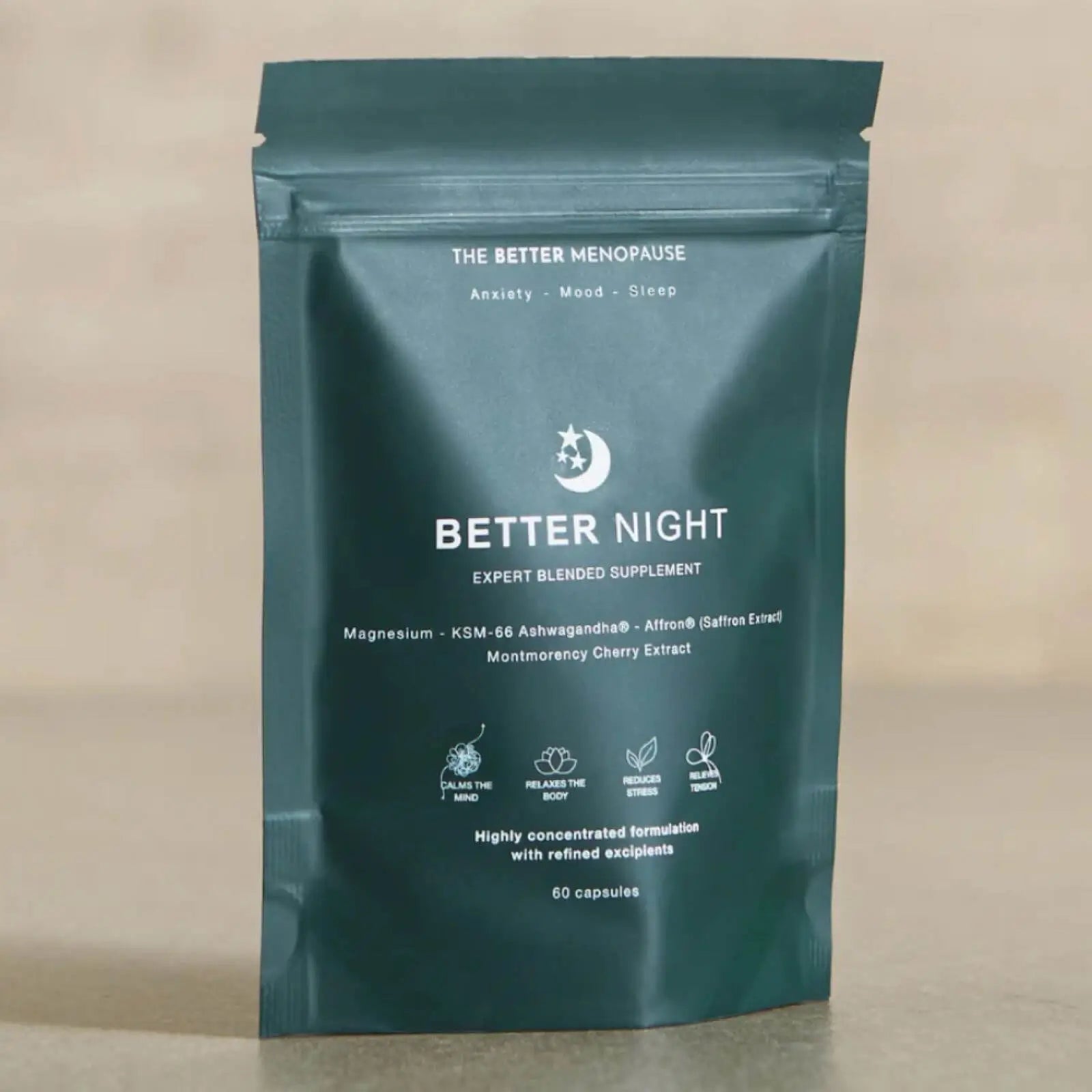
Natural supplements that may help with menopause weight loss
We assess the evidence that these natural supplements could aid weight loss and reduce belly fat during menopause, and look at what else you can do to maintain a healthy weight.
If you’re aiming to lose weight during perimenopause or after menopause, there are some supplements and natural remedies that may help.
Below, we’ll look at three supplements that show initial promise in managing weight, reducing belly fat or both, as well as one that could improve some contributing factors.
We’ll also explore whether oestrogen therapy (HRT) can help with menopause weight loss, and focus on the essential roles that regular exercise and the right diet play in maintaining a healthy weight and body composition.
The Better Gut probiotic supplements contain friendly bacteria that can help to manage a whole range of perimenopause and menopause symptoms, from bloating and digestive issues to hot flushes, anxiety and brain fog.
To find out more, visit The Better Menopause. And get 10% of your first order with the discount code WELCOME10.
How menopause can increase belly fat and weight
Weight gain is one of the most common symptoms of perimenopause and menopause. Large-scale studies suggest that, on average, women gain around 1.5 kilograms (kg) each year during the transition to menopause.
Reduced oestrogen levels lead to fat accumulating around your belly and upper body, rather than your hips and thighs. Some scientists think low oestrogen may also increase hunger signals from your brain, telling you to eat more.
At the same time, you can start to lose healthy muscle mass, leading to a slower metabolic rate – the amount of energy your body burns each day. Even if you don’t actually put on weight, your body composition may change, with a higher ratio of fat to muscle.
Can these supplements help with menopause weight loss?
Research looking specifically at the impact of food supplements on body weight and belly fat during perimenopause and after menopause is limited. However, there are several supplements that show promise in this area, and could help alongside a healthy diet and regular physical activity.
Maca root
The root of the Peruvian maca plant (Lepidium meyenii) has been used in traditional medicine for thousands of years.
Research suggests that maca can increase oestrogen levels in menopausal women and may help with a number of menopause symptoms, including maintaining a healthy weight.
In one small study, women in the early stages of post-menopause took daily supplements containing a total of 2 grams (g) of maca powder.
Although the study didn’t record specific measures of body fat, it did look at weight loss based on body mass index (BMI), a common way of categorising body weight across populations.
Researchers said that, after two months, the women saw a “highly significant” reduction in their average BMIs, as well improvements in other menopause symptoms like hot flushes.
Phytoestrogen supplements
Phytoestrogens are a range of plant compounds that mimic some of the functions of oestrogen in your body. Most phytoestrogen supplements contain either isoflavones – found in large amounts in soya beans – or lignans, which you can get from a range of beans and pulses, as well as many other whole plant foods.
Studies have shown that phytoestrogen supplements can help with menopause symptoms such as hot flushes – but when it comes to weight loss, things are a little more complicated.
A review of multiple studies involving a total of 1,880 postmenopausal women suggests that your general health could have an impact on how you respond to phytoestrogen supplements.
Across participants as a whole, researchers found that taking phytoestrogen supplements was linked to a slight decrease in waist-hip ratio, seen as an important measure of how abdominal fat is distributed.
They also found that healthy postmenopausal women who took phytoestrogens saw a modest decrease in their body weight compared with those who took a placebo.
However, in postmenopausal women with metabolic health conditions such as type 2 diabetes, high cholesterol and high blood pressure, taking phytoestrogens was actually associated with increased body weight.
Ashwagandha
Ashwagandha root is another traditional herbal remedy that may increase oestrogen levels and help with certain menopause symptoms.
While there isn’t much research looking specifically at the effects of ashwagandha on weight during menopause, one small study had promising results when it came to women and men with chronic stress.
After taking supplements containing 600 mg of ashwagandha each day for 8 weeks, participants had lost an average of 3% of their body weight and reduced their BMI by a similar amount. This was more than twice the reduction seen in a group that took a placebo instead.
Interestingly, those who took ashwagandha, also reported significantly fewer food cravings and less ‘emotional eating’.
Magnesium
There’s evidence that taking a supplement containing the essential mineral magnesium could help with a number of symptoms that are common during menopause, including poor sleep and anxiety.
Although there’s not much evidence that magnesium can have a direct impact on your weight, it's possible it could help by improving other menopause symptoms.
Poor sleep, for example, can reduce your metabolic rate, which can make it harder to lose weight.
Magnesium supplements can also help reduce bloating, which could be contributing to the feeling that you have a bigger belly.
Does taking oestrogen (HRT) reduce belly fat?
Hormone replacement therapy (HRT) replenishes the oestrogen and other reproductive hormones lost during perimenopause and menopause.
Since low oestrogen can contribute to increased belly fat, and HRT can improve a range of other menopause symptoms, you may wonder whether it can also help you to lose weight put on during menopause.
One review of multiple studies found little evidence that oestrogen therapy reduces either weight gain or increased body fat.
However, an older study found that while oestrogen replacement didn’t reduce participants’ overall weight, it did redistribute fat from the belly back to the hips and thighs where it’s more usually stored in women before menopause.
Either way, the NHS says there’s very little evidence that HRT actually makes you put on weight, as some people believe.
Other ways to get rid of menopause belly fat
It may not come as a huge surprise to hear that changing the way you eat and adding regular exercise to your routine can help you to lose weight during perimenopause and after menopause. These lifestyle changes can also reduce your waist circumference, waist-to-hip ratio and belly fat.
But what does a healthy diet for menopause look like? And what’s the best exercise to do?
How to improve your diet
Although eating fewer calories can help you to lose weight, restrictive calorie-counting diets rarely lead to long-term weight loss. In fact, losing weight too quickly can actually slow your metabolism, making it harder to keep weight off in the future.
Instead, make healthy swaps and focus on eating a wide variety of fibre-rich plant foods that could help you feel full for longer. Include leafy greens and switch refined grains like white rice, bread and pasta for wholegrain versions.
Make sure you get plenty of protein, as this will help maintain your muscle mass, which in turn will burn more calories. Studies have shown that postmenopausal women who eat more protein have less body fat.
Healthy sources of protein include legumes like beans and pulses, tofu, nuts and seeds, fish, poultry and natural dairy products without unnecessary additives.
Finally, try to limit foods and drink containing added sugar, as well as ultra-processed foods and snacks. Remember, these can include those that make health claims, such as ‘low fat’ or ‘high in protein’.
To find out more, read our dedicated article on how to eat a healthy diet for menopause weight loss.
What exercise to do
Regular strength training is the best form of exercise to help you lose weight, maintain muscle mass and increase the amount of fat you burn during menopause and as you get older.
It can involve lifting weights, using resistance bands or doing bodyweight exercises, like squats and press-ups. Try to do at least two sessions per week.
Health guidelines also recommend including at least 150 minutes each week of moderate to intense aerobic exercise, such as brisk walking, jogging, swimming or cycling, divided across the week.
If you don’t currently do much exercise, start slowly and use these as targets to work towards. It’s important to remember that any exercise is better than none.
Summary
Weight gain and increased belly fat are common symptoms of perimenopause and menopause, partly due to reduced oestrogen levels.
Certain supplements may be able to help you manage your weight during this time.
Studies suggest that maca root can reduce BMI in post-menopausal women.
Phytoestrogens such as soya isoflavones have been linked to modest weight loss and a small decrease in waist-to-hip ratio in healthy menopausal women. However, they’re associated with increased body weight in women with metabolic health conditions.
Ashwagandha supplements may contribute to weight loss and reduced food cravings in some groups of women and men. However, more research is needed looking specifically at its effects on body weight in menopausal women.
The most effective way to lose weight and reduce fat around your belly is with a combination of a balanced plant-focused, whole food diet, with plenty of healthy protein, and regular exercise, including strength training to maintain your muscle mass.
For help with a range of menopause symptoms, from bloating to hot flushes, anxiety to brain fog, try The Better Gut probiotic supplements.
To learn more, visit The Better Menopause. And use the discount code WELCOME10 for 10% off your first order.


